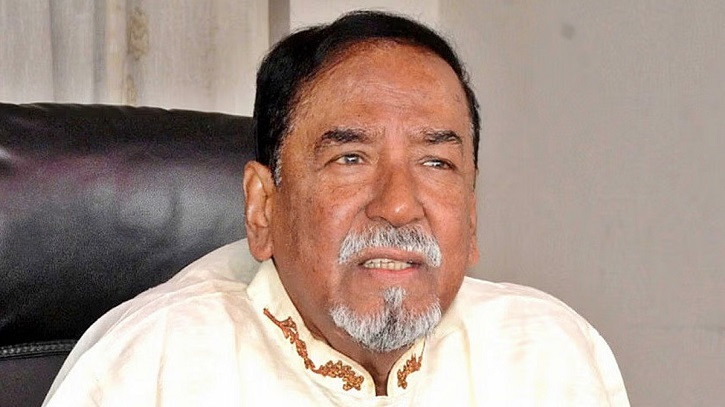Every adviser, except CA, enjoying taste of power: BNP’s Hafiz
Daily Sun Report, Dhaka
Published: 06 Apr 2025

BNP Standing Committee Member Major (Retd) Hafiz Uddin Ahmed has said that while the Chief Adviser Prof Muhammad Yunus has been preserving his status as a respected man, others in the government have tasted the allure of power and are unwilling to relinquish it.
In an interview with Bangladesh Pratidin’s Shafiul Alam Dolon the decorated freedom fighter said the government should prioritise holding elections by year-end, completing trials against Awami League fascists and repatriating money laundered during the 15-year Awami League rule. The interim government should shift focus away from state reforms and some negligible issues, he said.
Question: Your views on the country’s political landscape…
Answer: It is a mixed picture. On the positive side, Prof Yunus has upheld his global recognition and talked with foreign leaders with head held high. He has not compromised on national interests or used flattery in discussions with strongman foreign leaders. This is a matter of pride for Bangladeshis.
On the negative side, everyone else in the advisory council has fallen for the lust of power, and is unwilling to give up their positions easily. Even though they do not issue any clear statement on prolonging their stay, their excuses imply they want to stay on. They are bringing up new reform proposals every now and then, and talking about reform proposals that were not undertaken for five decades. These proposals would naturally take longer to implement. They are trying to say that if the elections are held before implementing these measures, the country’s democratic legacy would collapse entirely. People will not be able to bring about real change in state affairs by using their voting rights, these advisers appear to claim.
However, this is not true. Throughout histories, elected representatives have brought about changes in different countries. The politicians and elected officials may have some faults, but eventually they felt compelled to amend their ways and work for the countrymen. Therefore, only politically experienced elected public representatives can implement essential state reforms, and not some amateurs.
The young student leaders of last year’s uprising have formed a new party, raising high hopes among all. But, defying hopes, they too are following the questionable trends of corrupt politicians. One leader went to his home with a 100-car convoy, others are reportedly spending time at five-star hotels free-of-charge. As the hope dims, election is the only way to guide the nation.
As for BNP, it has its own faults. The party must reform itself before undertaking any other reform measure. Actions must be taken against questionable party members. I believe BNP is the party of Ziaur Rahman, and would not repeat the mistakes as well as wrongdoings of Awami League.
Question: The student leaders of anti-fascist uprising want to delay the national elections. The position of other influential, parties including Jamaat-e-Islami, on the election date is also unclear. When do you think the elections will be held?
Answer: Some people’s popularity is limited to a limited voter base, and they do not have connection with the overall general population. They naturally fear losing in elections. But they should not panic. There is still time before elections can be held towards the end of the year. In the meantime, these youth can prepare themselves and uphold their image before the people. Instead, they want more time to increase their popularity and defer the elections for longer. If allowed, this could destabilize the country. Furthermore, the new party, NCP, is clearly a “king’s party” as it has a leader, who was once an adviser in the interim government. The chief adviser himself encouraged the formation of NCP, making it undoubtedly a “king’s party.”
However, this party has failed to achieve any notable success, and is talking about delaying elections until they can properly organise.
Those now wanting to hold on to power by delaying elections and following the students’ demands must also think about their country and not only about their government position.
Question: Your take on the government’s state reform initiatives…
Answer: The interim government is formed with highly educated individuals. But, if some intellectuals could run the state, political parties would have lost their jobs long ago. Furthermore, these advisers and reform commission members may be highly educated, but what are their contributions for the country? What could they achieve for the country in the past?
Question: BNP has talked of forming a unity government based on consensus if voted to power. How can this be formed?
Answer: If voted to power, there is a possibility of us forming a unity government based on consensus among all the players in last year’s anti-fascist uprising against Awami League regime.
Question: Should Awami League be banned as a political party for its misdeeds?
Answer: I personally think the party should be banned for a couple of years.
Question: Jamaat-e-Islami is calling for introducing proportional representation in elections. Do you or your party support this?
Answer: We have been against this thoroughout. Our countrymen are not familiar with this and this could bring forth a number of apolitical people who have never worked for the greater mass in their life.
Question: What is your recommendation for the interim government?
Answer: The government must prepare for holding elections at the earliest, and not listen to some bookish intellectuals. Otherwise, there are laws and courts in the country to challenge election delays. There is also the people and the prospects of further uprising to establish voting rights. The government must bear these in mind. Policymakers must trust the people to elect capable representatives in earliest possible elections.

